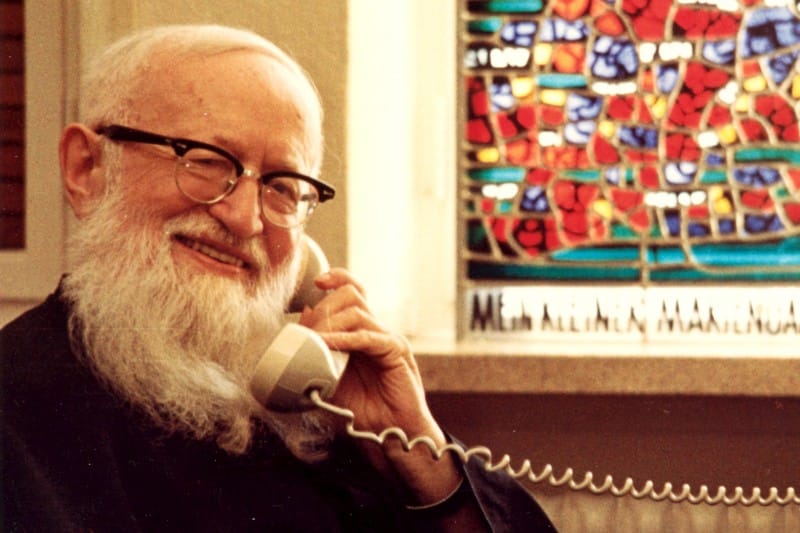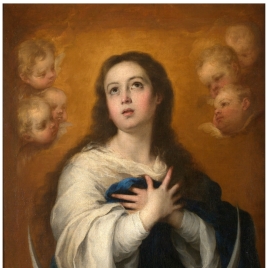Fr. Eduardo Aguirre, postulator of the cause for the canonization of Fr. Joseph Kentenich, founder of the Schoenstatt Movement, celebrated a Mass on September 15 in the Original Shrine of Schoenstatt, in Germany, where the movement was founded in 1914. The celebration took place 54 years after the death of the founder. The date coincided with the liturgical celebration of Our Lady of Sorrows.
Crosses in Fr. Kentenich’s life
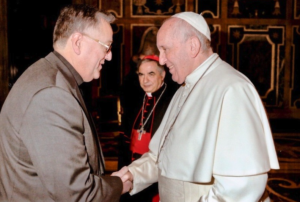
In his homily, Fr. Aguirre began by alluding to the previous day’s celebration, in which the Exaltation of the Cross was celebrated, and to that of September 15: Our Lady of Sorrows – Mary next to the cross. He connected both images with the crosses that Fr. Kentenich carried during his life. He commented that “the cross, in some way, is always present in the life of every Christian, with greater or lesser intensity; it is also a condition for our redemption. And if today we keep in mind the life of our father and founder, Father Kentenich, and the day he was called home to eternity, precisely on the day of Our Lady of Sorrows. We can see that in his life the mystery of the Cross was also always present. In order to live and offer himself radically in fulfilling God’s plans, he had to take up all the crosses in which God made him participate”.
Concentration camp and the Holy Office
Father Aguirre continued: “We cannot give an account of all the crosses he experienced, but we know that his passion was doing the will of God. He always discerned what the will of God was in order to carry it out without hesitation. And this fidelity and commitment to do the will of God led him many times to go through hard and painful moments of cross, such as the concentration camp in Dachau, and then, above all, the confrontation with the Church, with the Holy Office, for 14 years of exile, separated from his work, his Family and his homeland, with many misunderstandings and defamations, until he was able to return liberated in 1965 to the heart of his Schoenstatt Family”.*
Accusations that generate confusion and pain
On the occasion of a canonical Visitation of Schoenstatt by the diocese of Trier (1949) and later in the Apostolic Visitation by the Holy Office (1951-53), a group of some sisters of the Community of the Schoenstatt Sisters of Mary (which in those years already numbered about 1,800) complained to the Visitator. They spoke up saying that a cult of Fr. Kentenich had developed in the Sisters’ community and that he abused his authority, that he was manipulative and that he impeded the sisters’ freedom of conscience.
In the year 2020, when the archives of the Holy Office from the time of Pope Pius XII were opened, these accusations, which had already reached the Holy Office during the Apostolic Visitation, and which later had also been evaluated during the diocesan process for the beatification of Fr. Kentenich (and which were under the secrecy of the case) were made public.
On the subject Father Aguirre expressed that “that cross makes itself present in our Schoenstatt Family today. Two years ago a historian who was carrying out studies in the aforementioned declassified archives of the Holy Office, published denunciations and brought to light once again some of the accusations from the time of the Visitations against Father Kentenich. But she went further. Taking those accusations, she published a book where she even accused Fr. Kentenich of sexual abuse. We know, and we can prove, that these accusations are exaggerated, taken out of context, are biased and false. But, nevertheless, they have done harm, they have caused much pain in our Schoenstatt Family, confusion, indignation, and they have also created insecurity and have affected the cause of canonization of Father Kentenich”.
The Holy Office never accused him of a moral crime
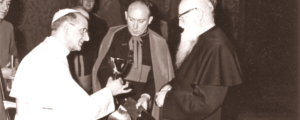
The canonization process is suspended
On the status of the cause of canonization of Fr. Kentenich, Fr. Aguirre explained that “in May of this year, Bishop Stephan Ackermann, the bishop of Trier, the diocese where the process of canonization of Fr. Kentenich is being carried out – because it is the diocese to which Schoenstatt belongs -, decided to pause the process.
Bishop Ackermann is responsible for dealing with cases of sexual abuse in Germany, before the German Episcopal Conference. It is up to him to confront these cases in front of the press and to take care of the pertinent processes. Therefore, as a result of these accusations that had been published recently, there was pressure for him to distance himself from the process of Father Kentenich. Kentenich’s case. And so he decided to suspend the case, which means that he is no longer going to take initiatives to push it forward, nor invest efforts in it for the time being”.
The process is still open
And he continued: “But, Bishop Ackermann specifies, this does not mean that the cause is closed, but that for now it remains in a state of pause, of stand by, of rest, until the accusations that have been published are thoroughly investigated and everything is satisfactorily clarified. When this happens, it will probably be possible to resume the cause, and that will mean that it will be able to reach Rome. Bishop Ackermann encourages a thorough investigation and the search for the necessary answers.”
It should be pointed out that this is the same attitude that the Schoenstatt Movement has, and that its General Presidium has maintained since the beginning of the aforementioned publications.
Fruits and positive consequences
Regarding the consequences of the publication of the said accusations, the Postulator affirms that “in spite of the fact that it has been a painful process, after two years we can confirm that there are fruits; that there are diverse positive consequences of all this that we are experiencing, and that we can look with optimism towards the future.
In Fr. Kentenich’s school, as his disciples and followers, we always have to ask ourselves: what does God want to tell us with all this? Why has God allowed this situation, these accusations and all this commotion that has taken place in relation with the cause? Obviously, it is not that God has “missed” this. We can say that, according to God’s plans, He allowed these accusations and their consequences to take place (…) We ask ourselves with a glance of faith: What are God’s plans, what does He want to tell us? And we can see several fruits. From the beginning, all this has led to the figure of our Father and Founder being more present in the conscience, in the concerns and in the heart of our Schoenstatt Family”.
In this sense, “one of the first reactions in the Schoenstatt Family in many countries has been forming of prayer groups, which had been developing before, but gained much more strength as a result of these publications. These are groups that every day pray for the cause of Fr. Kentenich, offer prayers, sacrifices and record the prayers heard, etc.”.
Why Kentenich was not diplomatic
Regarding the steps taken by the Schoenstatt Movement, Aguirre expresses that “all of this has required us to investigate in depth. Different research and elaboration teams have been created and we are disseminating the documents to which public access has only been available since 2020. All this helps us to know more deeply the person of Fr. Kentenich and to better understand why he acted so decidedly, putting at risk all his work, for the sake of the values that he considered were being questioned in his foundation; to better perceive why God allowed this confrontation with the Holy Office; why Father Kentenich was not more diplomatic and let the accusations pass by, able to avoid more conflicts. Why did he always respond, although with respect, but without ‘mincing his words’? Why did Father put the work at risk — the Church could have forbidden it”.
Challenges before a charism
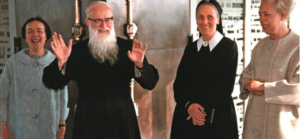
And he concludes: “We want to deepen in the charism of Father Kentenich, because that is the charism of Schoenstatt. So, what things do we have to give our best for? What must characterize us so that the Church welcomes and values this charism and so that it becomes fruitful for the renewal of the Church of the third millennium?
Obviously we are interested in the resumption of Father’s process, but that is not the most important thing or the primary objective of our efforts. I think that God wants us above all to renew ourselves in our identity, in our mission, as disciples of Fr. Kentenich, and that, rediscovering his prophetic figure and following his witness of holiness, we become fruitful for the Church”.
“I have full confidence that things will be clarified”
On the possible outcome of the controversies in question, the postulator shared that “this will mean that the cause will be reactivated in Trier at some point. I have no doubts that things will be clarified with full transparency and truth, and that Father Kentenich will be freed from these accusations. But the important thing is that we are in tune with God’s plans, with what He wants to achieve with what we are living through: that we identify ourselves more faithfully and decidedly, with audacity and dedication, for our charism and mission.
Another important fruit is that the Schoenstatt communities have worked in a much more coordinated way; there has been a great solidarity among the different research groups that have been formed. A group of investigators from outside Schoenstatt has also been formed to address and elucidate the truthfulness or falsehood of the allegations raised. And that is very good, because we have no fear about finding something that could damage the moral image of Fr. Kentenich. I have full confidence that things will be clarified. What interests us is that the truth be known with full transparency”.
A more human Father Kentenich
And he continues: “All this has helped us to approach the Father and Founder in a more objective and human way: to be clear that he was not infallible, that he made mistakes, that he was not perfect and that he was not always a saint from ‘the cradle’. That would be a very unrealistic image. He was a person who made – like every person – a life process in which he experienced many crosses, trials, and many difficult moments. In that process and with those trials, he was sanctified and became a saint at the end of his life.
All this is positive. A look that transcends the moment
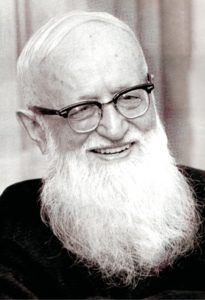
————–
Note: The texts in quotation marks belong to the above-mentioned homily of Fr. Eduardo Aguirre. They were revised by their author.
* The Exile and its Conclusion narrated by Fr. Kentenich: https://www.jkentenich.com/articles/the-exile-and-its-conclusion-by-fr-kentenich

